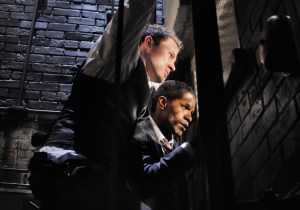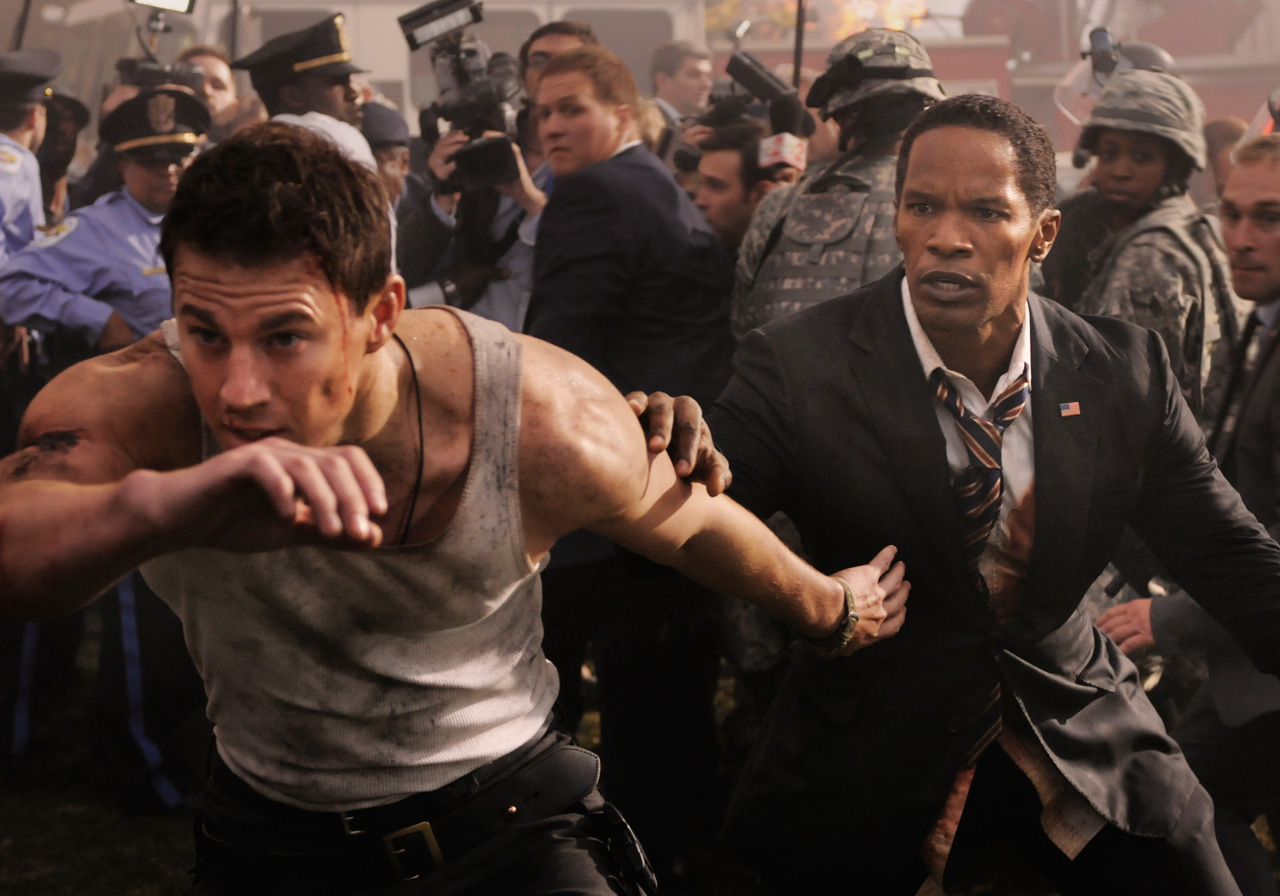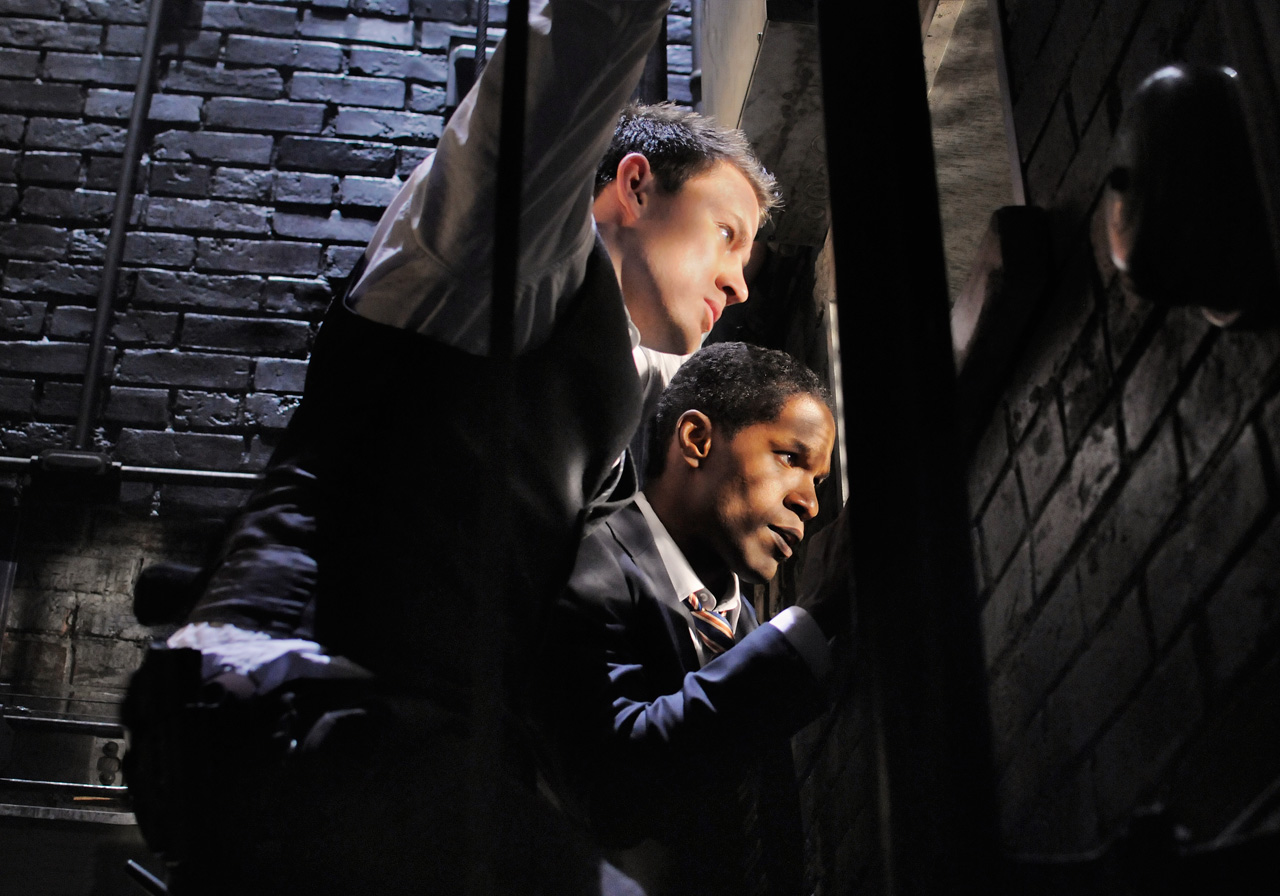If Roland Emmerich and Paul Feig have any luck, reviews of White House Down and The Heat will fly down rabbit holes to discuss extraneous matters, such as whether or not the former film makes liberals or conservatives look worse, and why Melissa McCarthy's image was digitally altered in early posters of the latter to make her look thinner.
And it would make perfect sense if critics go out of their way to discuss matters tangential to the films, since the movies themselves are so drearily, predictably bad.
In The Power of Habit, Charles Duhigg quotes radio consultant Tom Webster when summarizing what media creators and managers think is the safest way to protect their investment: "Stations have to take risks on new songs, otherwise people stop listening. But what listeners really want are songs they already like. So you have to make new songs seem familiar as fast as possible." Does this thinking apply to movies? White House Down had a reported budget of $150,000,000. The Heat clocks in with a more modest (reported) budget of $50,000,000. That's a lot of risk, so conventional wisdom states that Emmerich, especially, needs to make his film seem as familiar as possible as quickly as possible.
 Reiner Bajo / Columbia Pictures
Reiner Bajo / Columbia PicturesIncreasingly, for filmmakers that means not only limiting themselves to plots that can be described in a one sentence pitch—it's Die Hard at the White House!—but also reducing and using shorthand in those elements of the movie (usually the beginning and the end) that are the least generic. We see a stinging reminder that John Cale (Tatum) has missed his daughter's talent competition to set him up as a loving but flailing parent. We get a failed job interview to provide a quick summary of his action hero bona fides. In the background we get television reports of politically polarized responses to President Sawyer's (Foxx) controversial peace plan. (Step One: Remove all American troops from the Middle East. Step Two: Compare yourself to Lincoln for your bold and innovative thinking.)
But then the Capitol building blows up, shots are fired in the White House (I dare you to pretend you are surprised by who isn't who he/she appears to be), and we're off to the races. Two hours of explosions, gunfire, hand-to-hand and surface-to-air combat later, Israel and Iran decide the best possible response to our narrowly avoiding blowing up the rest of the world in a nuclear holocaust would be to unilaterally give up their own military ambitions and decide that yes, we can all just get along, thank you very much.
And I wouldn't want to spoil the end of the film by telling you whether or not Cale gets the Secret Service to rethink hiring him and/or wins newfound respect in his daughter's eyes.
Plenty of films are conventional, even repetitive, yet they still manage to be entertaining. Genre elements become conventional usually precisely because they are effective. If a new film follows a formula, it is because that formula worked successfully at one point or another. The problem with White House Down, like so many current action films, is that it doesn't really understand what made the films it is imitating successful or popular in the first place.
To cite just one example: compare John Cale to his most obvious prototype, Die Hard's John McClane. What made McClane so interesting was that he was part of a trend to make action heroes more plausible, more vulnerable, less indestructible supermen (like Rambo) and more marginally believable human beings (like Ellen Ripley). In one scene, a barefoot McClane had to walk on broken glass—he feels pain. We believed he could be killed because we saw he could be hurt. By contrast, Cale falls through skylights, dodges gunfire, crashes limousines, nearly drowns underwater, gets punched and kicked and nearly blown up by a grenade. His clothes get dirty but attrition never seems to make him physically challenged. McClane must use his head to figure out what is happening and how to stop it. Cale needs only run to the next power-up object. He is a video game player in a point-and-shoot maze whose only real objective is to kill what he can and run from what he can't.
Unable to do the conventional things better, White House Down, like many modern action films, tries to do the same thing louder and longer. And so we get a bloated action film, with a long middle section where we know not only that nothing bad will happen to indestructible hero, but also that nothing he will do for the next hour will help bring things to a close. About the time Cale and Sawyer are doing donuts on the White House lawn in front of cheering crowds, Emmerich decides it is time to throw in a little comic relief in the form of Sawyer accidentally hitting Cale on the head with a rocket launcher. A random soldier in a tank gets killed trying to defend them. The juxtaposition is positively cringe-inducing.
It wouldn't be possible to deconstruct the film's political leanings without major spoilers, but the motivations of the eventually revealed villain(s) are an offensive mix of political stereotype and psychoanalytic gibberish that I found more over the top than anything in Dr. Strangelove.
 Twentieth Century Fox
Twentieth Century FoxBut if the current state of the action drama is not very good, the action comedy isn't faring any better. While the plot of The Heat is about how an FBI agent (Sandra Bullock) and a local policewoman (Melissa McCarthy) team up to catch a drug dealer, its premise is even simpler: Women can be as crass, crude, and obnoxious as men.
Most writers will say comedy is the hardest genre to write, so it is worth noting that credited scribe Katie Dippold has been part of a writing team that has shared two Writers Guild of America nominations for the television show Parks and Recreation.
The writing strategy in this movie, though, appears to be to cast funny people and hope their delivery can carry the day.
Some of the "jokes" in the film revolve around a series of sports-themed paintings with Jesus inserted as one of the athletes, Sandra Bullock's character getting so drunk she can't remember why she gave her car and underwear to an elderly gentleman, a pun based on a murder victim's tongue being cut out and inserted into his rectum, and McCarthy's detective pulling a gun on the doctor who informs her that cell phone use is not permitted in the hospital hallway.
Is it unfair to describe the movie that way? I freely admit that some of the comedies I enjoy (Zoolander, The Simpsons) might sound equally bizarre if their jokes were simply described rather than performed, but that is half the point. Writing jokes is hard. Writing potentially funny situations is marginally easier, but only because the potential doesn't have to be realized before the paycheck is cashed.
But honesty compels me to report that I laughed exactly four times while watching The Heat. Three laughs were at particularly snappy personal insults. The fourth was a remark about Bullock's pajamas.
In the first half of The Heat, Bullock's FBI agent alienates her colleagues because she is genuinely abrasive. In the second and third acts, the film senses it needs something to make these two women more sympathetic, so the tune changes and suddenly the guys started becoming more overtly and pointlessly misogynistic so that the leads can bond over how hard it is to be taken seriously by men without threatening to shoot them all in the genitals.
But for all that, one doesn't have to look at the movie poster to see the film playing on the very stereotypes it pretends to descry. There is a running joke about how lonely Bullock's character is and how many one-night stands McCarthy's has had. It's pretty much the same joke about the average looking Will Ferrell being irresistible to his more attractive spouse (played by Eva Mendes) in The Other Guys, only with the gender roles reversed.
The only problem is that, in this case, The Heat is not reversing stereotypes to draw attention to how ridiculous they are—it is using them to show how true it thinks they are. Someone finds a weighty person sexually attractive. Isn't that hilarious?
There is a scene midway through The Heat where McCarthy's character talks about having to arrest and imprison her own brother. Given an actual, complex emotion to portray, the actress shines, and for a brief moment I tried imagining the film without all the fat jokes, slapstick, and assumed hilarity at the ridiculousness of the notion that women could do a dangerous and physically demanding job.
But hey, why take the trouble to write actual characters for two prestigious and decorated actresses when you can settle for jokes comparing their vaginas to a dusty attic full of unused Christmas ornaments?
The Family Corner
White House Down manages to keep a PG-13 rating by having the characters keep their clothes on, avoid the requisite accumulation of magic words, and privileging explosions, crashes, and gunfire over scenes of people actually dying. There are several scenes in which children are overtly or indirectly threatened, including one in which a loaded gun is placed to a child's head in a hostage standoff. As generic as these scenes are, the use of children in them could prove disturbing to young viewers. There is one scene in which security uses infrared technology to scan a room and we are shown the outline of a couple having sex. At least one character drinks alcohol to deal with stress, and the president talks about smoking cigarettes but is shown chewing nicotine gum.
At first blush it may seem surprising that The Heat warranted an R rating, but Melissa McCarthy uses the "F" word nine times . . . in her first scene. That's about typical for each scene in which she appears, and while the interjection of choice begins with "f," there is scarcely a profane or obscene phrase that doesn't get used repeatedly and to little effect. There is plenty of property damage, at least two lethal explosions, and a steady course of gun violence both real and threatened. One victim is shot, execution style, in the head, with ample blood splatter. Another is, in fact, shot in his genitals. The female leads get drunk and Bullock's character dances with her shirt completely unbuttoned. (She is wearing a bra.) One character has a poster on his wall that appears to show partial nudity. McCarthy's character speaks of having multiple one-night sexual encounters and jokes about the difficulty of getting men to stop calling her after she has had sex with them. One character is stabbed in the leg while being tortured. A man's throat is shown being cut open while he is choking, and blood splatters over two characters when this procedure goes wrong.











